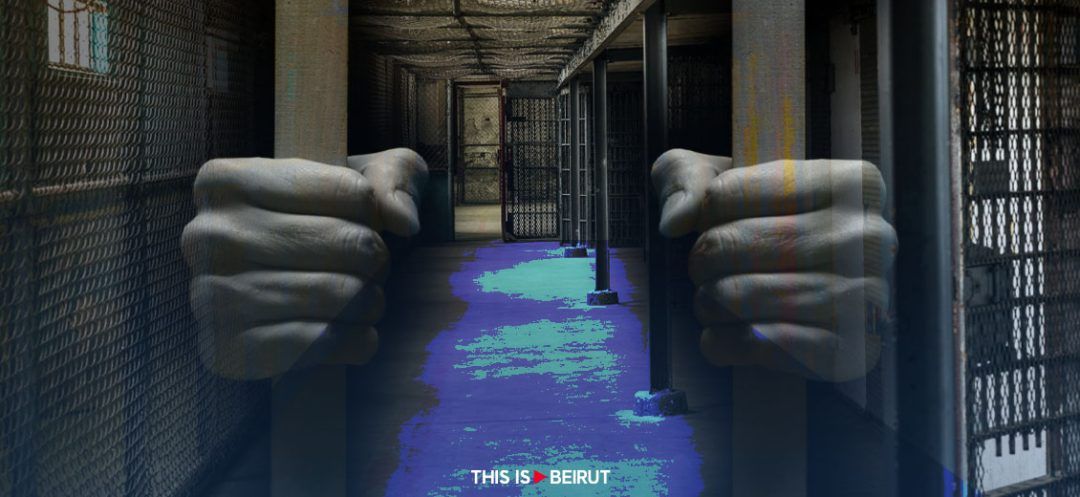
The problem of Lebanese prison centers is not limited to the economic crisis. In reality, most detention centers are overcrowded.
Human Rights Watch highlights the serious situation in Lebanese prisons, particularly due to the economic crisis that has plagued the country for more than 3 years. Saturation and the deterioration of living conditions in these facilities have reached an alarming level.
The problem of Lebanese penitentiary centers is not confined to the economic crisis. The majority of central prisons, such as Roumieh, Zahle, or Tripoli—along with women's detention centers in Baabda and Barbar Khazen—are facing a significant overcrowding problem. For example, Roumieh Prison, the largest in Lebanon, has a maximum capacity of 1,200 prisoners, but more than 4,000 are detained there. As for the total capacity of all penitentiary centers in the country combined, it is 4,760, with more than 8,500 prisoners being held within their walls. It is worth noting that 80% of the detainees are still awaiting trial.
According to an informed source interviewed by Houna Loubnan, "the real tragedy of Lebanese prisons remains saturation, which has reached 270%. That is, a cell designed for 10 detainees holds 27, not to mention poor infrastructure, the deterioration of health services and limited access to medicines and hospitals, endangering the lives of detainees, especially those suffering from chronic illnesses.
According to the same source, "the increase in crime rate, the slowness of trials and the investigative process, and the lack of decisions regarding the release of detainees only worsen things. Add to that the inability of the families of prisoners —who have served their sentences—to pay the required amounts for the release of their relatives. Some families cannot even afford to visit the inmates more than once every two months, given the high cost of transportation. This dire situation has given way to the 'e-visit' service, in collaboration with the Red Cross, which allows detainees to communicate via video call with their family members."
According to Amnesty International, the mortality rate in jails doubled in 2022 compared to 2018. In the same context, Mohammed Sablouh, lawyer and director of the Cedar Center for Legal Studies, laments the tragedy of prisons in Lebanon and explains that they "are no longer able to accommodate more prisoners. The cells reserved for custody have become prison cells. And the prisons of the Ministry of the Interior are saturated to the point that prisoners are sent to the military police, under the authority of the Ministry of the Interior." Sablouh holds the judges themselves accountable for the problem of penitentiary centers, as they slow down the judicial process. In addition to this, there is a lack of judges, and the few remaining ones are unable to go to their offices due to the high cost of transportation and their limited salaries.
Moreover, some receive additional tasks that exceed their capacity to compensate for the absence of other magistrates.
Furthermore, many prisoners suffer from malnutrition due to the economic crisis, rising food prices and a government that fails to reimburse prison suppliers. Before the crisis, most detainees ate what their families brought them or bought food from the prison cafeteria. However, families can no longer afford to feed their relatives, and a decision has been made to prohibit the supply of food to prisoners. The pretext is to limit the smuggling of prohibited items. Now, the detainee has to make do with lentil dishes prepared in the prison cafeterias and a single dish of red or white meat per week.
According to Sablouh, the most serious issue is "the poor quality of medical services and the total absence of doctors. Even if a detainee needs emergency surgery, the Ministry of the Interior will not cover the costs as it used to; now, it’s their family members who have to do it, and most cannot afford to pay. Several prisoners have already lost their lives due to slow treatment or the negligence of doctors."
Sablouh concludes, "If the children of our leaders were themselves incarcerated, the prison problem would not have been handled this way. On the contrary, international conventions would have been applied, and penitentiary centers would have become spaces for reform, not incubators for criminals."
In a phone call with Houna Loubnan, a prisoner states, "A detainee's life is a life of humiliation. Prisoners have become accustomed to polluted water, humidity, and bad odors. But that does not mean we should accept such a situation. It is a violation of human rights. We are afraid of getting sick; medicines are hard to find, and those who need to be hospitalized are forced to pay in dollars."
According to international health standards, "penitentiary centers must provide at least one healthy meal per day to each prisoner to keep them in good health. The food provided must be of good quality and well-presented. It is also the responsibility of institutions to give detainees access to drinking water as needed, as well as health services, free of charge, and without any distinction." That being said, Lebanese prisons are far from implementing these criteria, much like state institutions that need to be restructured under human rights.
Read more



Comments